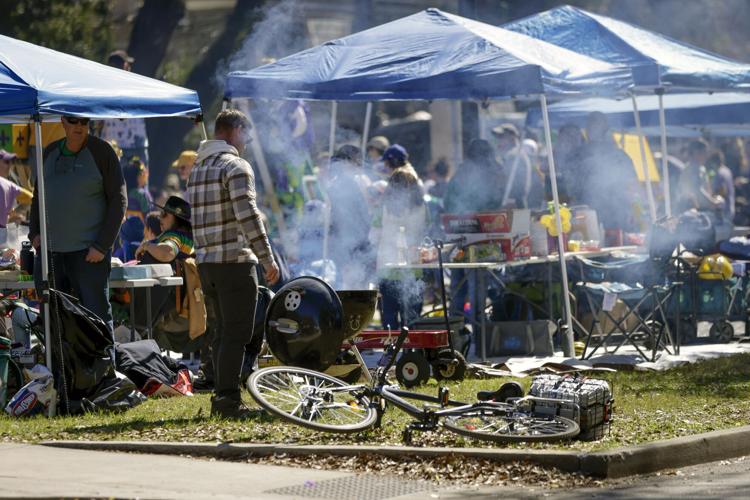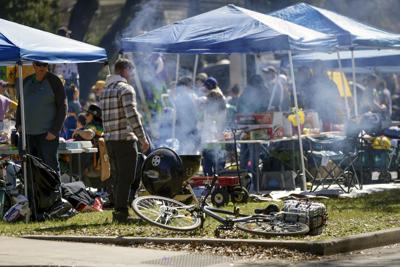Sprawling tarps. Paid sitters. Mannequins standing guard.
Whether it was pent-up public enthusiasm or a lack of high-profile code enforcement sweeps, 2023 seemed to be the year of the parade-route early bird.
Amanda Anjier, back in town for Mardi Gras for the first time in six years, noticed it right away.
Anjier, 27, grew up a few blocks from St. Charles and Napoleon avenues and remembers being able to grab a decent spot on the route shortly before a parade was set to roll.
“Now people are reserving space so far in advance and being rude about it,” said Anjier, a writer who now lives in Austin. “They think that if they put an empty chair down, the entire area is theirs ... That's not how Mardi Gras works."
Little visible enforcement
To many, the issue of paradegoers bogarting sections of the sidewalk and neutral ground seemed to be worse than ever this year. On social media, photos of tarps, enclosed tents, adjoining canopies, mega-ladders and orange plastic fencing drew condemnation from residents wondering why the city wasn't cracking down on clear violations of the law. A city ordinance forbids paradegoers from putting personal property on the public right of way more than four hours before the parade.

The Krewe of Iris parade rolls on the Uptown parade route in New Orleans, Saturday, Feb. 18, 2023.
Michael Karam, director of Parks and Parkways, issued a statement Wednesday saying the agency removed “several” oversized, unpermitted structures along the route during Carnival. But when it came to revelers improperly claiming public space, the city appears to have only documented these practices and taken them under advisement.
“Parkways also encountered roping off of public space, enclosed tents, oversized structures and portable toilets, which are not permitted,” Karam wrote. “These observations and past methods for ordinance compliance will be a part of after-action meetings to determine how future Carnival neutral grounds can be safe and accessible for all paradegoers."
This was no surprise to Anjier, who attended parades along the Uptown route Thursday through Monday.
“I didn’t see anyone taking anything down before the parades,” she said. “No one was enforcing anything.”
In 2018, Mitch Landrieu’s administration publicized sweeps ahead of the first official parades of the Carnival season, inviting the media to watch city crews with bolt cutters rounding up ladders along St. Charles Avenue and carting them away.
However, the get-tough approach was not met with universal approval. Some residents complained Landrieu's sweep was heavy-handed, and in a few cases, neighbors banded together to save one another’s ladders from the junkyard.
Asked if anyone was fined this season for violating the city's parade ordinance, a spokesperson for Mayor LaToya Cantrell noted the only section in the law that includes a fine is related to the placement of portable toilets. The administration did not say if violators of that section were fined.
Among other restrictions in the ordinance:
- Ladders, chairs and other personal effects must be placed at least 6 feet back from the street curb. Any items placed on a neutral ground four or more hours before the start of a parade may be removed by the city.
- Fastening two or more ladders together is illegal.
- Enclosed tents, scaffolding or the use of ropes, spray paint or other means to create a barricade or obstruct passage along public property is prohibited.
A perennial problem
The problem of space hogs is not a new one, nor is the practice of calling them out. It's been at least a decade since the emergence of The Krewe of Chad, a withering characterization of rule-violating early birds as spoiled, entitled and un-New Orleanian.
City Council member JP Morrell took to Twitter over Mardi Gras weekend to comment on the Cantrell administration's apparent lack of enforcement, saying it was too late for council action this year. But he promised to work on it for 2024.
“If we had known they were going to fall flat on their face beforehand we could have addressed it,” he wrote. “Now that we know, we will address it.”
Morrell also noted “one person” could have had the city's contractors haul things away, in an apparent reference to Cantrell.
“The person seems distracted and unwilling to piss off the people putting them up," he wrote. "In the absence of their action, the council will step up and resolve the issue.”
Getting ladders wrong
Another issue is ladders, specifically their size and placement. Traditionally a way of getting young children up high enough to be seen by float riders, ladders have increasingly been used by adults, and are often chained together. One photo emerged online last weekend showing a big, wooden mega-ladder that someone constructed to hold about six people across.
Mark Bologna, a 52-year-old from Fontainebleau, said he grew up as a “ladder kid” and is now a regular float rider. He sees more and more illegally placed ladders each year.
“In some cases, there was a row of parade ladders right in your face,” he said. “You almost had to arch and throw over them to get the people who were following the rules.”
Bologna, who has ridden with several krewes, said he tries to avoid throwing to people misusing ladders or in space-hogging tents.
“That was just my one, personal ‘What could I possibly do?’” he said.
Anjiers said she thinks the rise of short-term rentals is a major contributor to the erosion of Carnival etiquette, mostly because tourists now occupy parts of the route that were traditionally just locals. The problem snowballs, she said, when it's obvious that others are getting away with it.
Anjiers also thinks that moving most parades to a single route means that revelers have fewer places to watch. While she understands the practicalities of a consolidated Uptown route, “I do think that Mardi Gras should be returned to the people of New Orleans and the neighborhoods."
Leah Clark contributed to this report.



